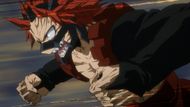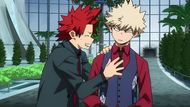My Hero Academia is acclaimed for its inspiring story of Midoriya, intense plot, and good world-building. But it is important to talk about how this series has examined the concept of masculinity in a healthy way.
And at a time where our culture is re-examining what it means to “be a man,” I find it refreshing, if not necessary, to highlight characters who are reshaping those age-old ideals into something healthier and more human. One of the best examples of this evolution is Eijiro Kirishima from My Hero Academia.
Kirishima isn’t toxic. He’s not insecure, power-hungry, or emotionally repressed. He doesn’t try to outshine others or assert dominance. Instead, he uses his strength to uplift.
He’s chivalrous without being condescending, competitive without being cruel, and most importantly, he’s kind. His character in My Hero Academia learns quickly that brute strength alone isn’t enough. His quirk has weaknesses. It’s predictable, linear, and without creative application, it gets outclassed. And yet, he doesn’t give up.

Instead, he adapts and evolves. He learns to use his power to shield others, not just punch harder. He finds purpose in defense, in being the shield rather than the sword. It’s a subtle but powerful message: masculinity, too, must evolve.
One of the most powerful aspects of Kirishima’s character is that he explicitly ties his masculinity to his personal code. He’s not just trying to be a hero—he’s trying to be a man in the way he believes a man should be.
Not as a weapon. Not as a shield. But as someone reliable. And yet he doesn’t weaponize that identity. He doesn’t use it to excuse toxic behavior. He doesn’t say “boys will be boys” or mock others for being different.
His masculinity is something he defines—not something he uses to define others. If more people adopted that mindset, I think we’d have fewer problems with the idea of masculinity at all. Finally, he never insults people to make himself feel better. He doesn’t feel the need to dominate or belittle others. Even more telling—he’s not sexually perverse.
In anime, especially shonen, it’s common to make the “manly” guy also the lecherous creep. Kirishima doesn’t fall into that trap. He feels like the kind of guy who would tell Mineta to grow up and get some self-respect.
Comparing Kirishima and Bakugo: Two Paths of Masculinity in My Hero Academia

This is where I think My Hero Academia makes a very deliberate statement. Kirishima and Bakugo are two sides of the same coin. Both are strong and driven, but their emotional approach could not be more different.
Bakugo suppresses. He bottles everything up, wraps it in anger, and explodes (literally and metaphorically) when he can’t contain it anymore. He’s terrified of weakness. Terrified of losing. His masculinity is built like a house of cards. It is impressive from a distance, but easy to topple.
Kirishima, on the other hand, is honest about his fears. About his limits. He’s not afraid to be emotionally available. And that’s exactly why people respect him, including Bakugo.
Final thoughts
There’s a scene during the Shie Hassaikai arc that always sticks with me. Kirishima, during a high-stakes fight, hardens himself beyond his normal limit, bleeding and cracking under the pressure just to keep fighting.
He’s doing it to protect others, even if his knees are shaking. That was one of the manliest moments in My Hero Academia. He is, in so many ways, surrounded by the darker versions of masculinity—and actively chooses not to emulate them.
